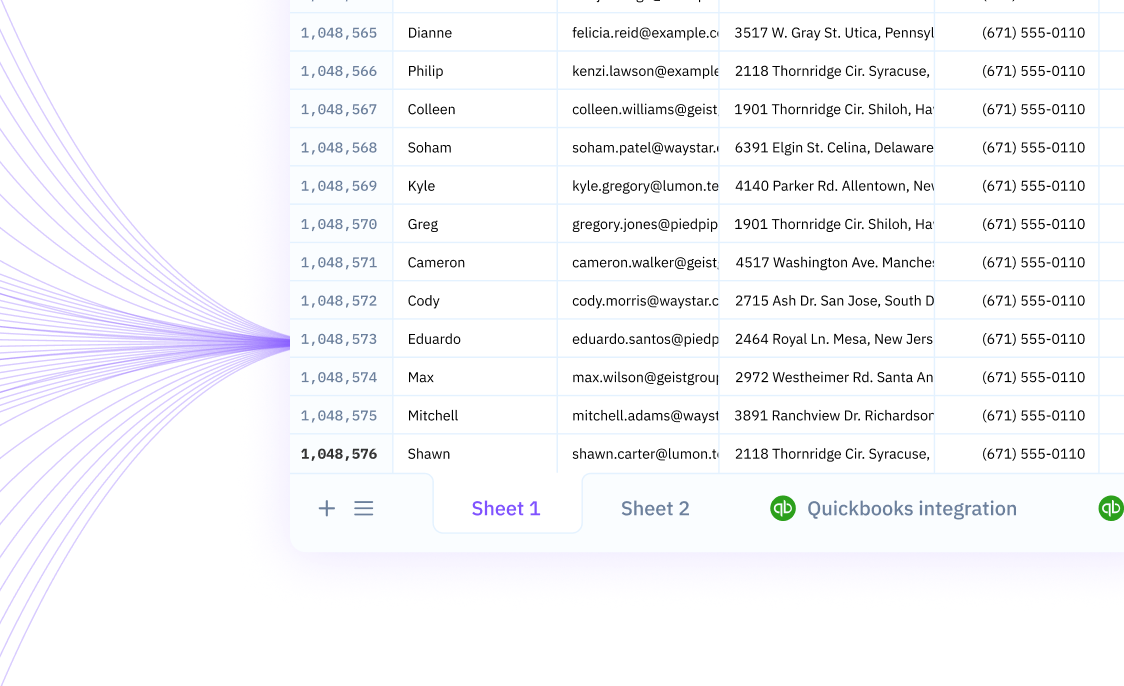
Export Postman to CSV

Overview
Postman, a versatile tool for API development, offers the capability to export product data to CSV files, enhancing data manipulation and sharing. By converting JSON responses to CSV format, users can directly create and populate Google Spreadsheets, enabling streamlined workflows and better data visualization through handlebar templates. On this educational page, we delve into the intricacies of Postman, provide a step-by-step guide on exporting data to CSV, explore various use cases for such exports, and introduce Sourcetable as an innovative alternative to CSV exports for enhanced data handling. Additionally, we'll address common questions about the export process to ensure a comprehensive understanding of leveraging Postman's capabilities to their fullest.
What is Postman?
Postman is an application designed for testing web APIs. It was initially created as a plugin for Google Chrome in 2012 and has since evolved into a standalone tool with both rich and thin client versions. Developed by Abhinav Asthana, Ankit Sobti, and Abhijit Kane, Postman is now utilized by over 500,000 companies globally and is headquartered in San Francisco.
This software tool facilitates the creation, maintenance, debugging, and support of web APIs. It regroups API tests into collections and allows for the use of variables that can change depending on the selected environment. Postman also incorporates a version control system for tests and environments, along with access rights managed per user roles. Furthermore, it provides benchmarks and supports importing and exporting data in JSON format.
Postman's capabilities extend to various API protocols, including REST, SOAP, GraphQL, and gRPC. It includes features such as the ability to upload files through its thin client and a debugging console that retains a history of requests and responses. This tool is a comprehensive solution for managing and interacting with web APIs.
Exporting Postman Data to a CSV File
Using sendRequest() Function in Pre-request Scripts
To export data from Postman to a .csv file, you can utilize the sendRequest() function within Pre-request Scripts. This function allows you to write the response data directly to a .csv file, effectively enabling the export of response data in the desired CSV format.
Utilizing Newman for CSV Reports
Another method involves using Newman, Postman's command line tool, which can run collections and generate reports. By employing the newman-reporter-csv module, Newman can produce a CSV-based output that summarizes the test run, providing a convenient way to export test results to a CSV file.
Workarounds for Saving Responses to a File
A workaround for exporting data from Postman is to use an inbound webhook to send the response data to a local API, which can then write the data to a file. Alternatively, a cloud-based service, such as SharePoint, can be used to achieve a similar result by collecting the Postman responses and storing them as CSV files.
Optimize Your Workflow with Sourcetable Integration
Move beyond the static nature of CSV exports and elevate your data management to real-time synchronization with Sourcetable. By importing your Postman data directly into Sourcetable, you harness the power of live data syncing from your apps. This dynamic approach not only saves time but also ensures that your data is always current, providing you with up-to-the-minute insights.
Sourcetable's intuitive spreadsheet interface makes it accessible to users of all technical levels, allowing you to query and analyze your data without the need for complex programming. Embrace the efficiency of automation by letting Sourcetable handle the repetitive task of data importation. Leverage this advanced business intelligence tool to streamline your workflow and make data-driven decisions with confidence.
Common Use Cases
-
Use case 1: Saving the response body data from a GET API in JSON format to a CSV file for further data analysisP
-
Use case 2: Using Newman with a CSV reporter to generate a CSV-based output for test result reportingP
-
Use case 3: Increasing the maximum number of records fetched by a GET API to 150k and exporting to CSV for large dataset handlingP
Frequently Asked Questions
Can Postman export data directly to a CSV file?
Postman cannot natively access the local file system to export data directly to a CSV file. However, users can write response data to a CSV file using the 'Write Responses to File' collection with the sendRequest() function in pre-request scripts.
How can I export Postman test results to a CSV using Newman?
Using Newman, you can export test results to CSV by utilizing the newman-reporter-csv package. Install the package with npm using the command 'npm i newman-reporter-csv', and then run your collection with Newman specifying the csv reporter.
Is there a way to write Postman data to the local file system?
While Postman cannot directly write to the local file system, you can use a workaround by utilizing an inbound webhook, a CI tool like Newman, or a scripting language such as PowerShell to write the data to a .csv file.
Can I use Postman to generate more in-depth reports in CSV format?
For more in-depth reports in CSV format, you can use Newman with an additional library like HTML extra to generate detailed test results, which can then be saved to your local file system or a CI tool.
Conclusion
Postman offers various methodologies to export data to CSV, enabling users to utilize the sendRequest() function in pre-request scripts or employ workarounds for writing response data to a CSV file. For comprehensive test reports, Newman, a command line tool, can be used alongside the newman-reporter-csv library to generate detailed CSV reports of your API tests and runs. While these methods are effective, there is an even more streamlined alternative: you can import your data directly into a spreadsheet using Sourcetable. Sign up for Sourcetable today to get started and elevate your data management without the hassle of exporting to CSV.


